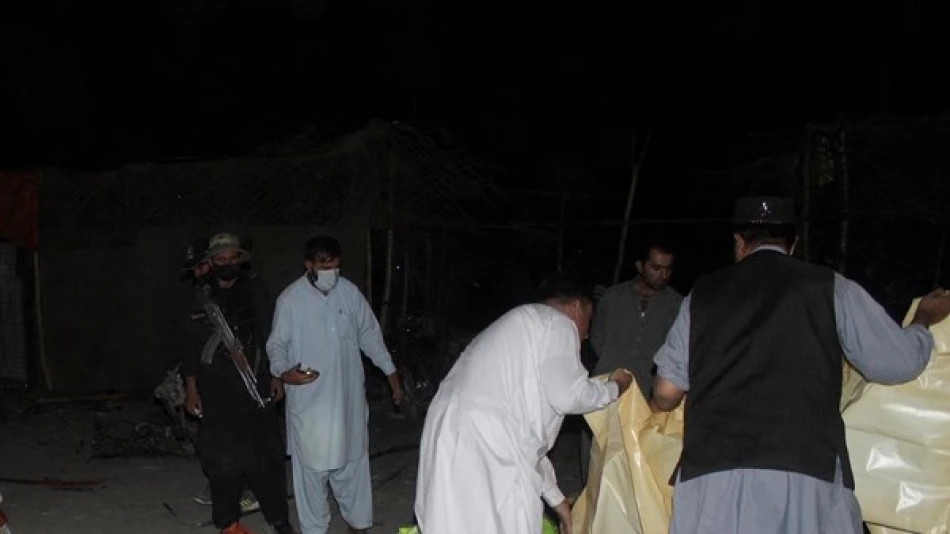
Deadly Bombings Claim 11 Lives in Pakistan's Volatile Region
Pakistan's Balochistan Province Faces Deadly Wave of Bombings as Security Crisis Deepens
Twin explosions in Pakistan's volatile Balochistan province have killed at least 11 people, marking the latest escalation in a region already reeling from ISIS-claimed attacks and separatist violence. The bombings, which targeted both security forces and civilian workers near the Afghan border, underscore Pakistan's growing struggle to maintain stability in its largest but most restive province.
Latest Attacks Highlight Border Vulnerability
According to provincial government officials, the first explosion killed five people, including three soldiers, while a second blast near an Afghan border crossing claimed the lives of six workers on Thursday evening. The attacks occurred in different areas of Balochistan, suggesting coordinated efforts to destabilize the region.
The timing and locations of these bombings reflect a strategic pattern targeting both Pakistan's security apparatus and economic infrastructure. Border crossings represent critical trade arteries between Pakistan and Afghanistan, making them high-value targets for militant groups seeking maximum economic disruption.
ISIS Foothold Expands in Strategic Province
These latest casualties follow a devastating suicide bombing earlier this month that killed 15 people at a political gathering in Quetta, Balochistan's capital. The Islamic State claimed responsibility for that attack, signaling the terror group's expanding operational capacity in the region.
The ISIS presence in Balochistan represents a significant shift in Pakistan's security landscape. Unlike the Taliban-affiliated groups that have traditionally operated along the Afghan border, ISIS brings different tactical approaches and international connections that complicate Pakistan's counterterrorism efforts.
Quetta: A Recurring Target
The attack on Quetta holds particular significance given the city's role as both provincial capital and a strategic hub connecting Pakistan to Iran and Afghanistan. Previous major attacks in Quetta have targeted minority communities, security installations, and political figures, reflecting the diverse array of militant objectives in the region.
Balochistan's Complex Security Challenge
Pakistan's largest province by area but smallest by population, Balochistan sits at the crossroads of South Asia, Central Asia, and the Middle East. This geographic position makes it both economically valuable and security-sensitive, particularly given China's massive investments in the China-Pakistan Economic Corridor (CPEC) infrastructure projects.
The province faces multiple layers of instability: Baloch separatist movements seeking independence, religious extremist groups like ISIS, cross-border militant infiltration from Afghanistan, and tribal conflicts over resources. This complexity makes traditional security approaches insufficient.
Economic Stakes Rise with CPEC
China's $62 billion CPEC investment, centered largely in Balochistan through the Gwadar Port project, has raised the stakes considerably. Beijing has repeatedly expressed concerns about worker security, and continued attacks could jeopardize future infrastructure development that Pakistan desperately needs for economic growth.
Regional Implications Beyond Pakistan
The deteriorating security situation in Balochistan affects broader regional stability. The province shares borders with both Iran and Afghanistan, and militant activities often spill across these porous frontiers. Iran has previously conducted cross-border operations against militant bases in Balochistan, while Afghanistan's Taliban government struggles to control its own border regions.
For international observers, Balochistan serves as a barometer for Pakistan's overall governance capacity. The military's ability to secure this strategic province directly impacts Pakistan's credibility as a regional partner and investment destination.
Lessons from Other Conflict Zones
Similar border provinces in other countries—from Colombia's conflict zones to Mali's northern regions—demonstrate that purely military solutions rarely succeed without accompanying political and economic development strategies. Pakistan's challenge lies in balancing immediate security needs with longer-term governance improvements that could address root causes of militancy.
The frequency and sophistication of recent attacks suggest that militant groups are adapting faster than Pakistan's security responses. Without a comprehensive approach addressing both immediate threats and underlying grievances, Balochistan's cycle of violence appears likely to continue undermining Pakistan's broader stability and development goals.
Most Viewed News

 Layla Al Mansoori
Layla Al Mansoori






